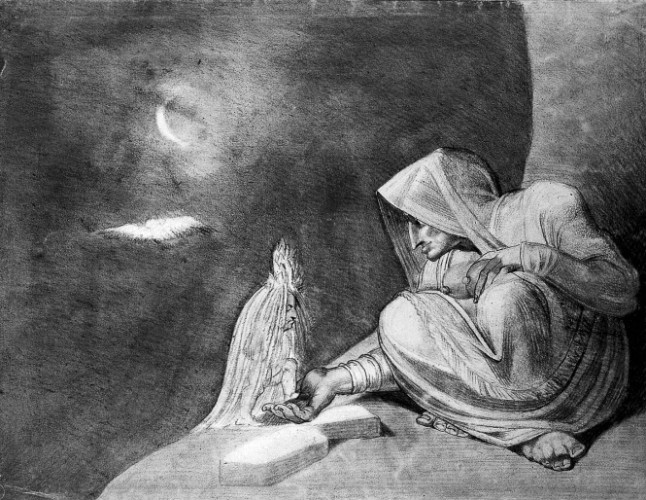http://www.medievalists.net/2014/09/07/constructing-wicked-witch-discourses-power-witch-hunts-early-modern-germany/
Constructing the Wicked Witch: Discourses of Power in the Witch-Hunts of Early Modern Germany
By Sharon Hanna
The Great Lakes Journal of Undergraduate History, Vol.1 (2013)

Introduction: For the people of early modern Germany, the witch was
not the cackling menace of fairytales or myth, but a real-life scourge
on society that needed to be purged from their lives. As humans who had
succumbed to the devil’s seduction, witches were the manifestation of
demonic presence that had infiltrated everyday experience. It became
society’s mission to eradicate these insidious influences through
aggressive witch-hunts, which at times reached such a furor that this
period is remembered as a “witch-craze”. However, these hunts were not
driven by indiscriminate mass hysteria. Instead, the female sex was
systematically identified as the threat. In Germany, women made up over
two-thirds of those prosecuted or executed.
Thus, women’s historians have argued that the witch-hunts cannot be understood without using gender as a category of analysis, in addition to other perspectives of race, class, or culture. Using this framework, it becomes obvious that these witch-hunts were less about magic or heresy and more the expression of a contested power relationship between the sexes. In a public display of male dominance, the witch-hunts turned female exertions of power into criminal behaviour – creating a social construction that exploited fears over the supernatural to ensure gender conformity.
argue that the witch hunts of sixteenth and seventeenth-century Germany evolved into the manifestation of a gendered power struggle as the male hierarchy attempted to re-assert their authority in a context of religious upheaval and class conflict. Contemporary texts such as Malleus Maleficarum, trial records, and letters between religious elites demonstrate that women were targeted as witches due to the fact that their societal roles were perceived as threats to the established power relationship between the sexes. The portrayals of witches as malevolent mothers, heretics, and sexual deviants were accusations levied by an insecure patriarchal structure to subjugate women who were not conforming to increasingly conservative paradigms of femininity. I ground my arguments in historiographical context, followed by exploring the general atmosphere in which the witch-hunts started. I show that an anxious German male hierarchy used the pretext of the language and values around witchcraft as a way to exert social control over male-female power relationships and reinforce conventional domestic ideals in a context of socio-political uncertainty.
Constructing the Wicked Witch: Discourses of Power in the Witch-Hunts of Early Modern Germany
By Sharon Hanna
The Great Lakes Journal of Undergraduate History, Vol.1 (2013)

A
witch in the moonlight, opening her hand to a small creature (a child
?) dressed in a white veil. Drawing after H. Fuseli, 1850/1900. Credit:
Wellcome Library, London
Thus, women’s historians have argued that the witch-hunts cannot be understood without using gender as a category of analysis, in addition to other perspectives of race, class, or culture. Using this framework, it becomes obvious that these witch-hunts were less about magic or heresy and more the expression of a contested power relationship between the sexes. In a public display of male dominance, the witch-hunts turned female exertions of power into criminal behaviour – creating a social construction that exploited fears over the supernatural to ensure gender conformity.
argue that the witch hunts of sixteenth and seventeenth-century Germany evolved into the manifestation of a gendered power struggle as the male hierarchy attempted to re-assert their authority in a context of religious upheaval and class conflict. Contemporary texts such as Malleus Maleficarum, trial records, and letters between religious elites demonstrate that women were targeted as witches due to the fact that their societal roles were perceived as threats to the established power relationship between the sexes. The portrayals of witches as malevolent mothers, heretics, and sexual deviants were accusations levied by an insecure patriarchal structure to subjugate women who were not conforming to increasingly conservative paradigms of femininity. I ground my arguments in historiographical context, followed by exploring the general atmosphere in which the witch-hunts started. I show that an anxious German male hierarchy used the pretext of the language and values around witchcraft as a way to exert social control over male-female power relationships and reinforce conventional domestic ideals in a context of socio-political uncertainty.





0 Comentarios